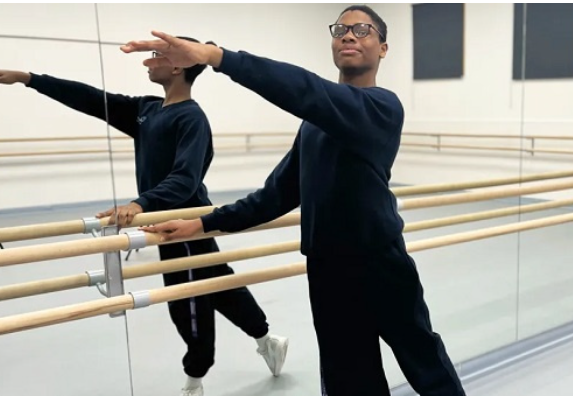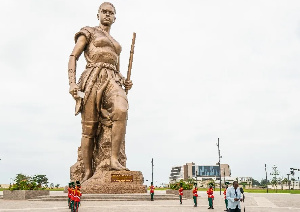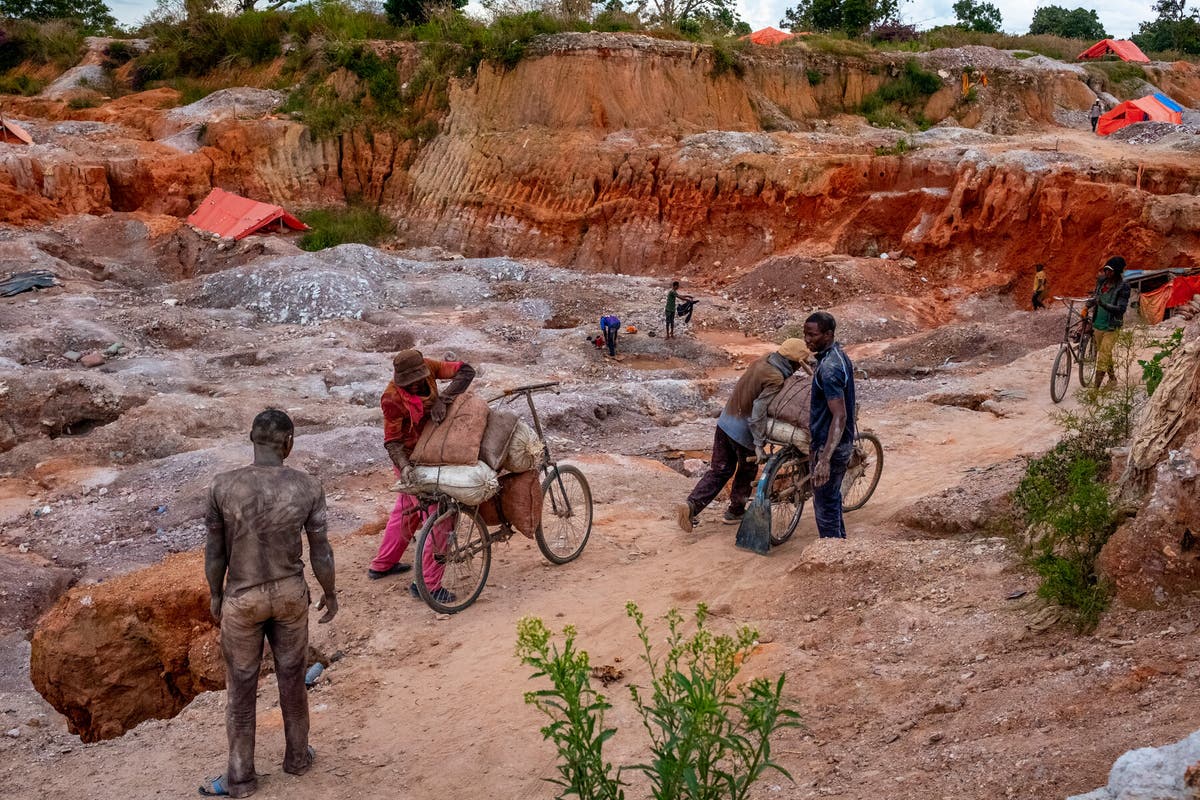Nigeria’s viral ballet boy: From Lagos to elite dance school

It was his dance teacher who filmed the young boy in June 2020 as he practiced pirouettes barefoot in the rain.
Afterwards, he uploaded the video to social media where it caught the eye of Hollywood actress Viola Davis who shared it with her huge following on Twitter, now known as X – and the clip amassed 16 million views.
It led to Anthony being offered a scholarship at the Jacqueline Kennedy Onassis School at the American Ballet Theatre. However, Covid-19 restrictions at the time meant the training had to take place online.
It was then that Anthony was given a chance to study at Elmhurst Ballet School in Birmingham – which had seemed to him an unattainable dream.
“So when I got the scholarship, I was surprised but really happy,” the teenager, who has now been at Elmhurst for just over a year, tells the BBC.
Sitting in one of the school’s practice studios, he shyly admits it has not been an easy transition.
“For the first year, it felt really, really hard trying to adjust to like the weather compared to Nigeria and also missing home as well,” he says.
However, he has now settled down and enjoys the strictures of his new dance regime.
“I video call my mum every day and hang out with my friends. Here, we do more classical ballet. It has to be precise, like having the arms right.”
Anthony grew up in a community with no dance schools, let alone classical ballet schools. Without the chance for formal training, he taught himself through watching videos and copying moves that fascinated him.
It was a hobby that surprised his family.
“When he was five years old, I saw him dancing. I thought: ‘What is wrong with you?'” Ifeoma Madu, Anthony’s mother, who still lives in Lagos, tells the BBC.
“People were telling me that this type of dance is not for boys. But it’s what he loves doing, so I let him go for it,” she says.
As Anthony’s interest developed, his family moved to a different neighbourhood in the city so he could attend the Lagos Leap Dance Academy.
“The day the video went viral, I wasn’t meant to go to class that day. I was just doing the dance and then my dance teacher decided to film it,” he remembers.
“When I came for a practice the next day, he told me that it’s got over thousands of views.”
But most aspiring ballet dancers across Africa do not have Anthony’s luck or opportunities.
Mike Wamaya, a ballet teacher in Kibera – Africa’s largest informal urban settlement – in Kenya’s capital, Nairobi, is impressed by Anthony’s story.
“It is very rare to see young boys getting scholarships from Africa to go outside to dance,” the 48-year-old, who has more than 250 children taking his classes, tells the BBC.
“Over the years, ballet has been linked to only the elite community and now slowly we are breaking it.”
Mr Wamaya admits too that many young boys on the continent do not pursue ballet because of the social stigma associated with it.
“People are very homophobic and as a male dancer, you are called gay. Because of the tights, showing our muscles,” he says.
“This built a lot of resilience in us. We got teased a lot but I’m very happy that my students used the teasing to prove those people wrong.”
Despite the challenges, the dance coach encourages gifted students like Anthony to keep focused and keep dancing.
“Take care of your mental health and your mental well-being because it’s so competitive,” he advises.
“But at the end of the day, it’s not about what people see. It’s about what you use dance for what is important.”
Siphesihle November, a South African dancer who has made it internationally, agrees about the image problem ballet has in Africa.
From South Africa’s Western Cape province, his talent was also spotted young. A Canadian couple in South Africa was so impressed when they saw him perform at age 11 that they initially sponsored his trip to Canada where he got a scholarship to the National Ballet of Canada.
Now a principal dancer there, the 24-year-old believes social media is helping to promote classical ballet in Africa.
“In my township and surrounding areas, it’s become more popular. But there’s a long way to go bridging the gap between those small schools and international schools,” he tells the BBC.
Anthony has already inspired other young people in Nigeria and the rest of Africa to pursue their dancing ambitions.
His journey is also to be shown to a much wider audience as Disney is making a documentary about it. Called Madu, it is currently in post-production and will be seen at film festivals in cinemas around the world when released.
“Anthony’s journey is a beautiful one, full of courage, growth, and acceptance,” Disney’s Marjon Javadi said last year.
Pride in his success is not limited to his mother, who says Anthony wants to become a professional dancer when he grows up.
His ambitions have also caught the attention of Calvin Royal III – the third African-American ballet dancer to rise to the rank of principal with the American Ballet Theatre – and Anthony’s inspiration.
“I can’t tell you how proud I am of you,” Royal tells the BBC in a specially recorded message to the young dancer. “Keep going. Keep soaring.”
Life in Birmingham is also broadening Antony’s horizons, as there is more on offer academically at Elmhurst.
“When I was in Nigeria, I didn’t do things like art. But now I love drawing. And learning other dances too. Aside from ballet, contemporary is my favourite,” he says.
However, he admits his mother is less impressed by his changing accent, which now has an English lilt.
And as he absorbs Royal’s words – his advice to other aspiring dancers is similar: do not lose your tenacity.
“There might be struggles along the way but remember it’s just temporary and it will be worth it in the end.”
Source: bbc.com





